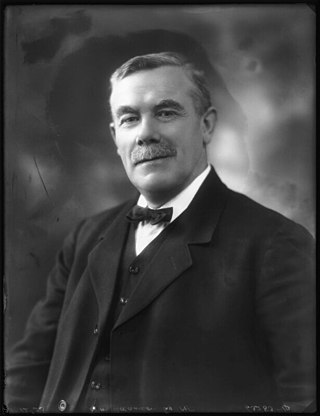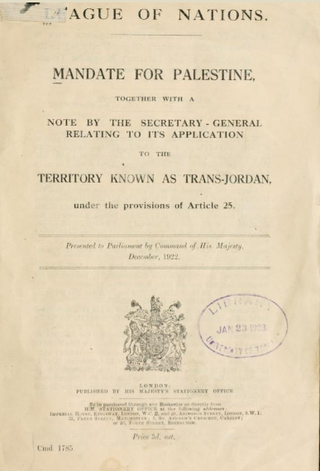
The Irish Free State, also known by its Irish name Saorstát Éireann, was a state established in December 1922 under the Anglo-Irish Treaty of December 1921. The treaty ended the three-year Irish War of Independence between the forces of the Irish Republic – the Irish Republican Army (IRA) – and British Crown forces.

The San Remo conference was an international meeting of the post-World War I Allied Supreme Council as an outgrowth of the Paris Peace Conference, held at Castle Devachan in Sanremo, Italy, from 19 to 26 April 1920. The San Remo Resolution passed on 25 April 1920 determined the allocation of Class "A" League of Nations mandates for the administration of three then-undefined Ottoman territories in the Middle East: "Palestine", "Syria" and "Mesopotamia". The boundaries of the three territories were "to be determined [at a later date] by the Principal Allied Powers", leaving the status of outlying areas such as Zor and Transjordan unclear.

The Government of Ireland Act 1920 was an Act of the Parliament of the United Kingdom. The Act's long title was "An Act to provide for the better government of Ireland"; it is also known as the Fourth Home Rule Bill or (inaccurately) as the Fourth Home Rule Act. The Act was intended to partition Ireland into two self-governing polities: the six north-eastern counties were to form "Northern Ireland", while the larger part of the country was to form "Southern Ireland". Both territories were to remain part of the United Kingdom of Great Britain and Ireland, and provision was made for their future reunification through a Council of Ireland. The Act was passed by the British Parliament in November 1920, received royal assent in December, and came into force on 3 May 1921.

The Irish Republic was an unrecognised revolutionary state that declared its independence from the United Kingdom in January 1919. The Republic claimed jurisdiction over the whole island of Ireland, but by 1920 its functional control was limited to only 21 of Ireland's 32 counties, and British state forces maintained a presence across much of the north-east, as well as Cork, Dublin and other major towns. The republic was strongest in rural areas, and through its military forces was able to influence the population in urban areas that it did not directly control.

The Emirate of Transjordan, officially known as the Amirate of Trans-Jordan, was a British protectorate established on 11 April 1921, which remained as such until achieving formal independence in 1946.

The War Measures Act was a statute of the Parliament of Canada that provided for the declaration of war, invasion, or insurrection, and the types of emergency measures that could thereby be taken. The Act was brought into force three times in Canadian history: during the First World War, Second World War, and the 1970 October Crisis.

The Treaty of Sèvres was a 1920 treaty signed between the Allies of World War I and the Ottoman Empire. The treaty ceded large parts of Ottoman territory to France, the United Kingdom, Greece and Italy, as well as creating large occupation zones within the Ottoman Empire. It was one of a series of treaties that the Central Powers signed with the Allied Powers after their defeat in World War I. Hostilities had already ended with the Armistice of Mudros.

William Adamson was a Scottish trade unionist and Labour politician. He was Leader of the Labour Party from 1917 to 1921 and served as Secretary of State for Scotland in 1924 and during 1929–1931 in the first two Labour ministries headed by Ramsay MacDonald.

The Titles Deprivation Act 1917 is an Act of Parliament of the United Kingdom which authorised enemies of the United Kingdom during the First World War to be deprived of their British peerages and royal titles.
The First Amendment of the Constitution Act 1939 amended the Constitution of Ireland to extend the constitutional definition of "time of war" to include a period during which a war occurs without the state itself being a direct participant. It was introduced and signed into law on 2 September 1939, the day after the Invasion of Poland by Germany and allowed the government to exercise emergency powers during World War II although the state was neutral.
The Third Dáil was elected at the general election held on 16 June 1922. This election was required to be held under the Anglo-Irish Treaty signed on 6 December 1921. It first met on 9 September and until 6 December 1922, it was the Provisional Parliament or the Constituent Assembly of Southern Ireland. From 6 December 1922, it was the lower house of the Oireachtas of the Irish Free State, until its dissolution on 9 August 1923.

The Defence of the Realm Act (DORA) was passed in the United Kingdom on 8 August 1914, four days after it entered the First World War and was added to as the war progressed. It gave the government wide-ranging powers during the war, such as the power to requisition buildings or land needed for the war effort, or to make regulations creating criminal offences.

The partition of Ireland was the process by which the Government of the United Kingdom of Great Britain and Ireland divided Ireland into two self-governing polities: Northern Ireland and Southern Ireland. It was enacted on 3 May 1921 under the Government of Ireland Act 1920. The Act intended both territories to remain within the United Kingdom and contained provisions for their eventual reunification. The smaller Northern Ireland was duly created with a devolved government and remained part of the UK. The larger Southern Ireland was not recognised by most of its citizens, who instead recognised the self-declared 32-county Irish Republic. On 6 December 1922, a year after the signing of the Anglo-Irish Treaty, the territory of Southern Ireland left the UK and became the Irish Free State, now the Republic of Ireland.

The Emergency Powers Act 1920 was an Act of the Parliament of the United Kingdom that gave the Sovereign power, in certain circumstances, to declare a state of emergency by proclamation. The Act also authorised emergency regulations to be issued by Order in Council.

Parliament of Sierra Leone is the legislative branch of the government of Sierra Leone. It is principally responsible for making laws. The Sierra Leone parliament consists of 149 members, of which 135 members are directly elected from across Sierra Leone's 16 districts, while 14 are paramount chiefs appointed from the 14 rural districts. The parliament is led by the Speaker of the House; the position is currently held by Abass Bundu of the Sierra Leone People's Party. The current elected 135 ordinary members of parliament are composed of members of the All People's Congress and the Sierra Leone People's Party which are the two largest political parties in Sierra Leone.
The Department of Soldiers' Civil Re-establishment was established by the Dominion Government of Canada in 1918 to handle the major problem of returning Canadian servicemen to civilian life after the First World War. In 1928 it merged with the Department of Health to form the Department of Pensions and National Health, with its former responsibilities being carried out by the Pensions Division.

The Mandate for Palestine was a League of Nations mandate for British administration of the territories of Palestine and Transjordan, both of which had been conceded by the Ottoman Empire following the end of World War I in 1918. The mandate was assigned to Britain by the San Remo conference in April 1920, after France's concession in the 1918 Clemenceau–Lloyd George Agreement of the previously-agreed "international administration" of Palestine under the Sykes–Picot Agreement. Transjordan was added to the mandate after the Arab Kingdom in Damascus was toppled by the French in the Franco-Syrian War. Civil administration began in Palestine and Transjordan in July 1920 and April 1921, respectively, and the mandate was in force from 29 September 1923 to 15 May 1948 and to 25 May 1946 respectively.

The Revolutions of 1917–1923 were a revolutionary wave that included political unrest and armed revolts around the world inspired by the success of the Russian Revolution and the disorder created by the aftermath of World War I. The uprisings were mainly socialist or anti-colonial in nature. Some socialist revolts failed to create lasting socialist states. The revolutions had lasting effects in shaping the future European political landscape, with for example the collapse of the German Empire and the dissolution of Austria-Hungary.

An Act for prohibiting Trade with the Barbadoes, Virginia, Bermuda and Antego or Act prohibiting Commerce and Trade with the Barbodoes, Antigo, Virginia, and Bermudas alias Summer's Islands was an Act of law passed by the Rump Parliament of England during the Interregnum against English colonies which sided with the Crown in the English Civil War.

The Palestinian Citizenship Order 1925 was a law of Mandatory Palestine that created a Palestinian citizenship for residents of the territory of Palestine Mandate. It was promulgated on 24 July 1925 and came into force on 1 August 1925. The Order remained in effect until 14 May 1948, when the British withdrew from the Mandate, and Palestinian citizenship came to an end. Israel enacted a Citizenship Law in 1952, while West Bank residents came under Jordan’s nationality law.













